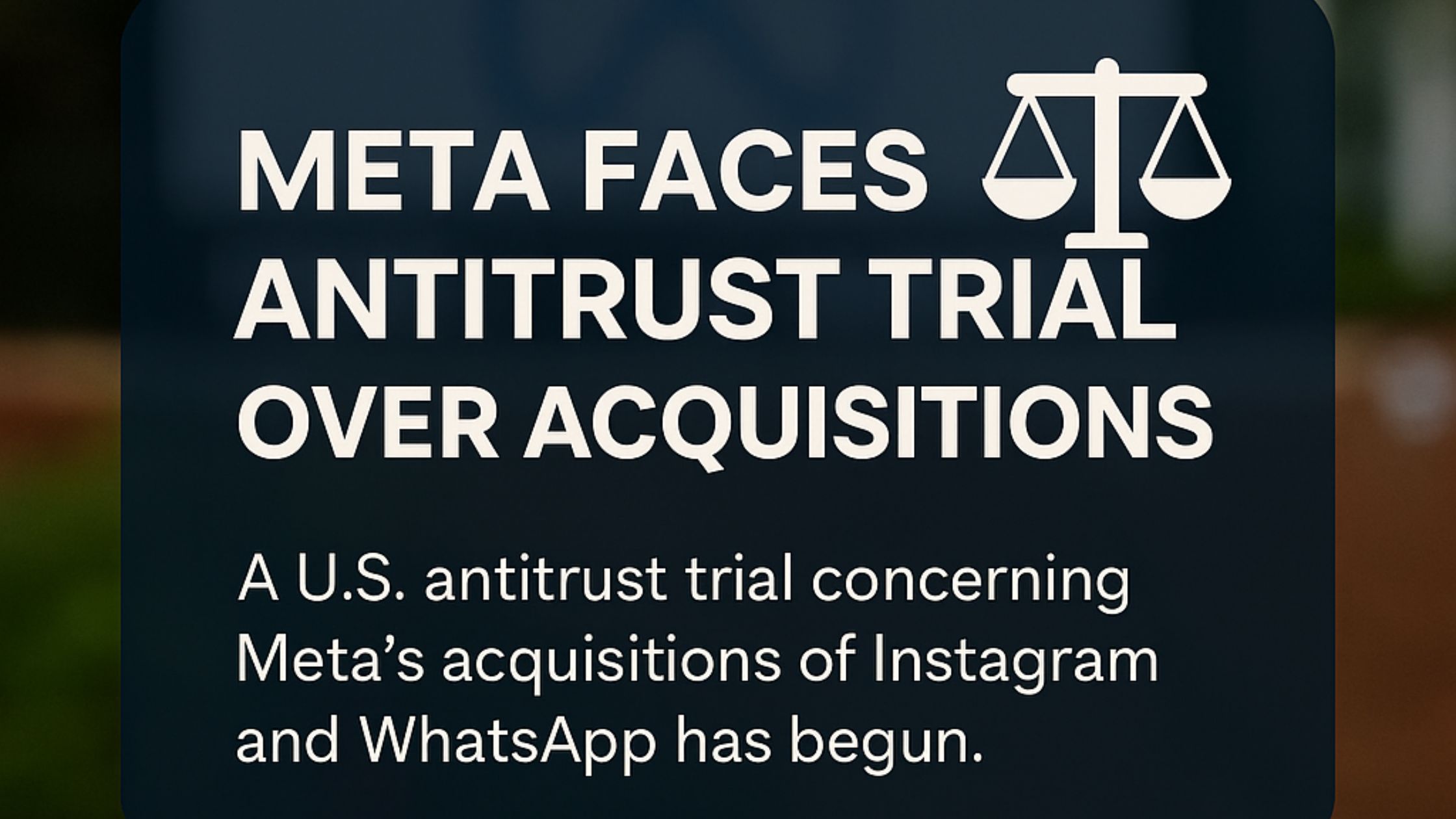Meta Faces Antitrust Trial Over Acquisitions
Introduction
Hey there! So, have you been following what’s happening with Meta (you know, the company behind Facebook, Instagram, and WhatsApp)? They’re in some serious hot water right now. Meta is undergoing a significant antitrust trial in Washington, D.C., with the FTC seeking to reverse its acquisitions of Instagram and WhatsApp. The case centers on allegations of Meta’s “buy or bury” strategy to eliminate competition, with CEO Mark Zuckerberg defending the acquisitions as strategic moves.
What’s the Deal with Meta’s Acquisitions?
The company previously owned Instagram but not WhatsApp as part of its corporate history. At that time in 2012 Meta made a decision to purchase Instagram for $1 billion which astounded people. Meta completed the acquisition of WhatsApp by paying $19 billion during 2014 only two years after purchasing the social media platform. The acquisition of platforms by Meta transformed the company into one of the dominant forces in social media domain.
Why did they do it? According to Meta the acquisitions were meant to drive platform innovation for user improvements. Both critics together with the FTC dispute that Facebook’s acquisitions were targeted at suppressing competitors when they were still relatively weak.
In the present day the FTC (Federal Trade Commission) demands that Meta cease operations. You have to discuss the way you acquired Instagram and WhatsApp
What Is the FTC Claiming?
What Is the FTC Claiming? The Federal Trade Commission (FTC) considers unfair competition as the core issue in its dispute against Meta. According to the FTC Meta acquired Instagram and WhatsApp to destroy businesses that otherwise would compete against them. This, they say, has led to:
-
Less innovation: The absence of competitive threats allows Meta to avoid innovative product development. Fewer advertising competitors result in increased prices for advertisements.
-
Higher ad prices: Fewer players in the market mean less competition, which can drive up costs for advertisers. Consumer freedom would have been broader if Instagram maintained its independence.
-
Stifled consumer choice: Imagine if Instagram had stayed independent. Would it be a different kind of platform today?
FTC Chair Lina Khan is no stranger to taking on tech giants. She’s built her reputation on tackling monopolistic practices, and this trial is a big deal for her—and for Meta.
Why Does This Matter?
Why should people get involved in the governmental legal battle that exists between Meta and the authorities? Well, there’s a lot at stake:
- Potential Breakup of Meta:The court’s support of the FTC could force Meta to break apart its holdings of Instagram and WhatsApp. That’s huge!
- Setting a Precedent: The court proceedings at this trial will establish standards for regulators who intend to manage Google and Amazon alongside Apple.
- Impact on the Digital Economy: The digital economy functions greatly through the advertising business generated by Meta. The potential breakup of Meta would significantly impact the present digital advertising format.
What’s Happening in the Courtroom?
What’s Happening Early in this month the trial began drawing significant media attention. Here are some juicy tidbits: Records of Meta internal emails released at that time demonstrated some executives expressed concerns about competing with the Instagram platform. For his part in the trial Mark Zuckerberg testified directly before the court. In his defense Zuckerman explained how the deals offered improved user experiences instead of diminishing market competition. Multiple key elements from the details exist for those who want to explore further. Want to dig into some of the details? You can check out a live report from Reuters here.
What Are People Saying?
Many individuals express different viewpoints about this situation: Antitrust specialists view this case as establishing important legal principles which modernize regulatory standards forTech era companies. Consumers: Reactions are mixed. The strength of Meta causes many people to believe the company should face stricter regulations. Subscribers state that Instagram together with WhatsApp would not possess their present qualities if they did not have Meta’s economic backing.
What Happens if Meta Loses Acquisition Antirust Trial?
The FTC could implement several major repercussions if it wins the acquisition antitrust trial. Instgaram and Whatsapp may regain independence from Meta by separating into individual companies. Stricter Regulations: Not just for Meta, but for all tech giants. Acquisitions moving forward will most likely encounter intensified examination procedures. The process of acquisition strategy review becomes likely among business entities especially when they attempt to buy out direct competitors.
What’s Meta Saying About All This Antitrust Trial?
The defense provided by Meta during the antitrust trial comprises two main points. The defense from Meta states plainly that it does not operate as a monopoly but rather functions as an innovation industry. They argue that: The popularity of both Instagram and WhatsApp depends heavily on continuous support from Meta. Multiple competitors operate in the same marketplace because TikTok and Snapchat currently challenge their operations. The strategy presented by Meta enters unsure territory when judged through legal standards. That’s the billion-dollar question.
In Short:
Meta’s defense boils down to this: “We’re not a monopoly; we’re innovators.” They argue that:
- Instagram and WhatsApp wouldn’t be as successful today without Meta’s support.
-
Competition is alive and well—just look at TikTok, Snapchat, and others giving them a run for their money.
Why This Trial Could Change Everything
This isn’t just about Meta. The proposed regulations will determine the manner in which society governs the entire technology sector. The FTC’s victory at court may trigger multiple future regulations meant to restrain companies such as Meta and Google along with Amazon. The court case reaches beyond U.S. borders because regulatory bodies from Europe and Asia watch its progress. European and Asian regulatory organizations keep their eye on this situation. A severe impact on Meta following this legal action might trigger regulatory steps against analogous companies operating both within and outside US borders.

Final Thoughts on What’s Next?
The trial process intends to finish this year although the repercussions will continue throughout several future years irrespective of its final determination. The Financial Times along with Business Insider are trustworthy sources which provide the latest industry news. This trial between Meta and antitrust authorities represents a crucial event in modern technology developments. This case extends beyond one firm because it deliberates the equilibrium between developing fresh product solutions and maintaining reasonable business competition. The dual trial will create lasting impacts on the market regardless of which side you support with your allegiance. What do you think? Is government intervention justified to break up Meta or does the agency cross boundaries? Discussion is open in the comments section.

